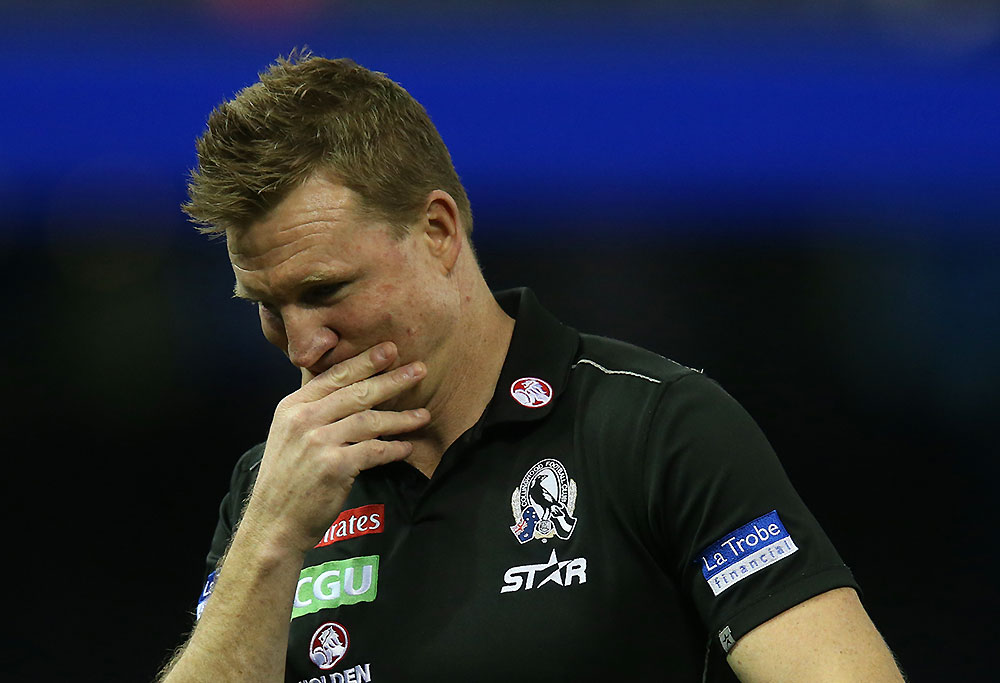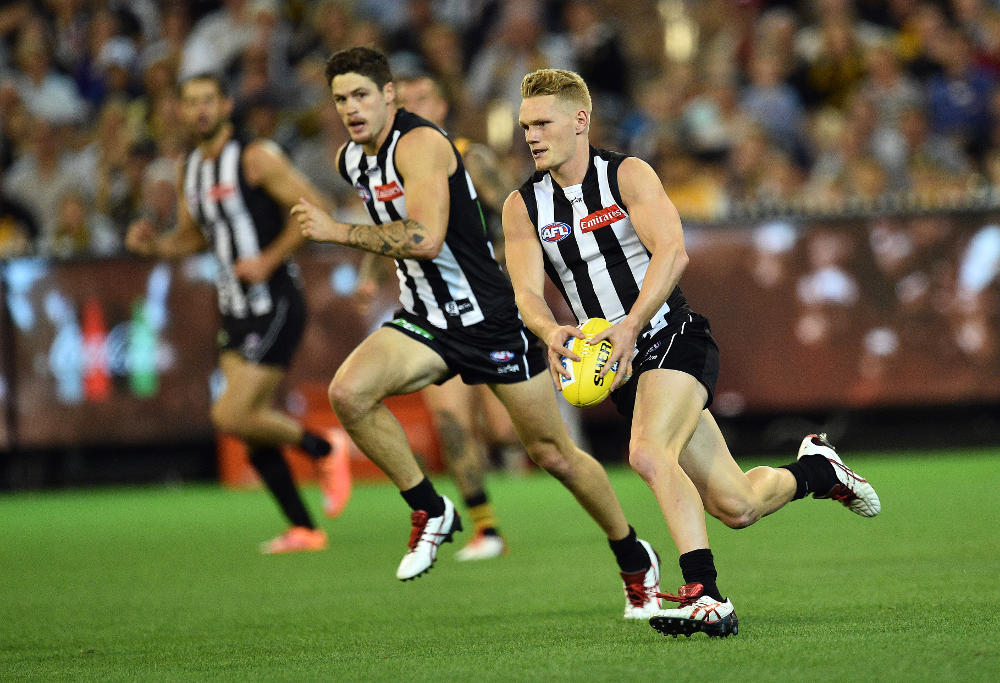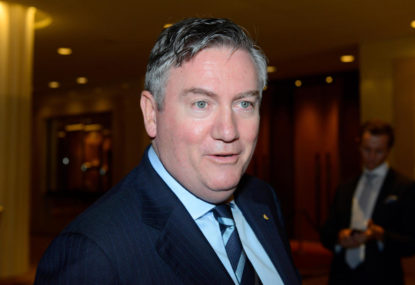Collingwood are off to another languid start, with the Pies a dropped Kieren Jack chest mark away from an 0-5 start to the 2017 season.
The pressure is on, but it is ill directed. Where is Eddie McGuire in all of this?
A 1-4 start is a close to a worst case scenario for Collingwood as one could have envisaged coming into the year. But in hindsight, the manner of their losses was always foreseeable.
The Pies’ on-field problems begin and end in their forward half, with an attacking set that has simply failed to take advantage of its opportunities.
Collingwood has a season-long inside 50 differential of +5.6 per game (ranked fourth), and has pumped the ball into their attacking zone 57 times a game (ranked fifth). To date, they have scored on just 42.9 per cent of their entries (ranked 16th), and kicked goals on just 42.3 per cent of their scoring shots (dead last).
Collingwood has been defending well enough, with average ratings on the stats above. The Pies have a clearance differential of +5.8 per game (ranked third), and a contested possession differential of +10.6 per game (ranked fourth). To compound matters, Collingwood has lost each of its four games by 19 points or less. Ouch.
It is a matter of executing at the pointy end separating the Pies from a winning and losing record. Collingwood were not challenging for a premiership this year, and so a slow start based on woeful forward half execution is not fatal. Nathan Buckley’s job as Collingwood’s head coach is not under threat.
Still, here we are, once again asking the same questions.
Is Collingwood coach Nathan Buckley under pressure? How many wins does Collingwood need for Buckley to be safe? Can Buckley coach? Even though the Pies didn’t play until Tuesday, the papers and web pages of all the major outlets are filled with answers. However, one whopping set of questions have gone unasked.
What role has Collingwood president Eddie McGuire played in Collingwood’s so-called malaise? To what extent are AFL club presidents accountable for on-field performances? Should Collingwood president Eddie McGuire’s position come under scrutiny?

Never mind the tangential-to-football media missteps and errors McGuire has become known for in recent years. They are important, but not the reason for Collingwood’s slide. That has ostensibly been powered, directly and indirectly, by football-related decisions that McGuire as club president would have had direct oversight.
There is the recruitment of high priced and high profile free agents. As I understand most clubs require personnel decisions involving long contracts or large sums, or that involve other risks, are required to be signed off by the club’s board. The four-year, $2-million contract afforded to Chris Mayne would have fallen under this category, so to the three-year deal granted to injury-prone Daniel Wells.
The jury is out on the latter, given his very strong performance earlier this week was his first in a Collingwood jumper. But the Mayne experiment looks like an albatross just five weeks in. Mayne was mostly finished as a key forward when he left Fremantle, and while the Pies undoubtedly had a need for more height in their forward line, trusting Mayne to be a safe pair of hands appears an egregious error.
Part of that decision rests on the short-lived reign of Graham Allan as Collingwood’s director of football. According to reports from The Age’s Caroline Wilson earlier this year, Allan was a significant player in the Pies’ free agency moves this off season.
His tenure at Collingwood was short but full of impact, and in more ways than one.
The recruitment of Allan, initially (and unconvincingly) to oversee Collingwood’s AFLW and netball programs, but eventually to run the organisation’s football department, led to the loss of Neil Balme to Richmond.
Allan’s departure was foist upon the Pies by his involvement in Greater Western Sydney player Lachie Whitfield’s illicit drugs code violation. Allan’s role was enabler, harbouring Whitfield against the code’s rules. He was suspended by the AFL for 12 months, and subsequently resigned as Collingwood’s director of football.
Again, according to The Age, the AFL’s investigation was ongoing during Collingwood’s due diligence period on Allan’s initial appointment to the Pies in his non-football department role.
This is a failure of Collingwood as an organisation, which much travel up the chain to board level given the significance of Allan’s appointment. Once more, the accountability for a decision which set back Collingwood’s on-field performance falls onto the club’s most senior leader.
It doesn’t end there. Two years into Buckley’s tenure as head coach, Collingwood began a stealth rebuild, with one aim to remove from the club a culture which had seen its players move from the back to front pages of Melbourne’s tabloids.
The Pies’ 2010 premiership side was one of the youngest and least experienced in modern times, thought to be a dynasty in the making. It might well have been given many of those players remain productive at AFL level. It is one of the great counterfactuals in the modern league.
Don’t get me wrong. I really like Collingwood’s list as it is currently constructed, particularly through the middle of the ground, where the unit is living up to and possibly beyond its potential. It is evidently short on forward talent, an oversight of mine coming into the season. The team’s defence has performed better than most expected, but again the talent holding up the back line could be improved on its current build.

I don’t have an issue with what Collingwood did. But if Collingwood has problems, this sticks out as a reason why.
Somewhere along the line, the football department decided to change direction. There are one of two issues at play here. The change in strategy should have been run by the board for endorsement, and the board endorsed it. The football department acted without board level approval and this is the consequence. Both represent a failure of organisation-wide leadership if you believe the Pies erred.
And finally, and most obviously, was the orchestrated coaching handover from master Michael Malthouse to apprentice Nathan Buckley. The deal was done in 2009, with Buckley to succeed Malthouse at the conclusion of the 2011 season. Malthouse had a deal to remain an employee of Collingwood, as director of coaching to ease the transition. He instead chose to become a pundit, before an ill-fated few years as Carlton’s head coach.
It is another great counterfactual. By the time Malthouse was chewed up and spat out of Carlton’s machine, it was abundantly clear he had lost what made him one of the game’s best coaches. But that was half way through the 2015 season – he left Collingwood after a crushing grand final defeat in 2011. Who knows what would have happened if he’d stuck around.
This one is all on McGuire. In 2009, Collingwood’s president hitched his wagon to the Nathan Buckley train. On this alone, the fates of Buckley and McGuire should be intertwined.

This does not appear to be the case. On Valentine’s Day, Eddie McGuire was effectively re-appointed as the president of Collingwood by default, after a deadline for someone to nominate to challenge him for the position passed with no takers.
McGuire’s tenure is ostensibly secured, regardless of how the current on-field performance of Collingwood plays out. Reckoning for decisions made by or under the close watch of McGuire, all contributing factors to where the club sits today, appears to be directed by default to Buckley.
The Collingwood president has done remarkable things for his team since taking over in 1998. He put in place strategies and made deals to entrench Collingwood’s status as a financial powerhouse, and poached Malthouse from West Coast – the first act of their run to the 2010 premiership undoubtedly.
McGuire is a vigorous defender of football’s market based mechanisms, and has evidently been trusted by AFL House to advise on many issues central to the league’s long term health and well being.
But if football is a results business, as Buckley has himself said on many occasions, accountability for where Collingwood now finds itself should – even must – sit with its president.
If we are once again asking if Nathan Buckley is the right coach for Collingwood, perhaps for once we might ask if Eddie McGuire is the right president for Collingwood.
































































































